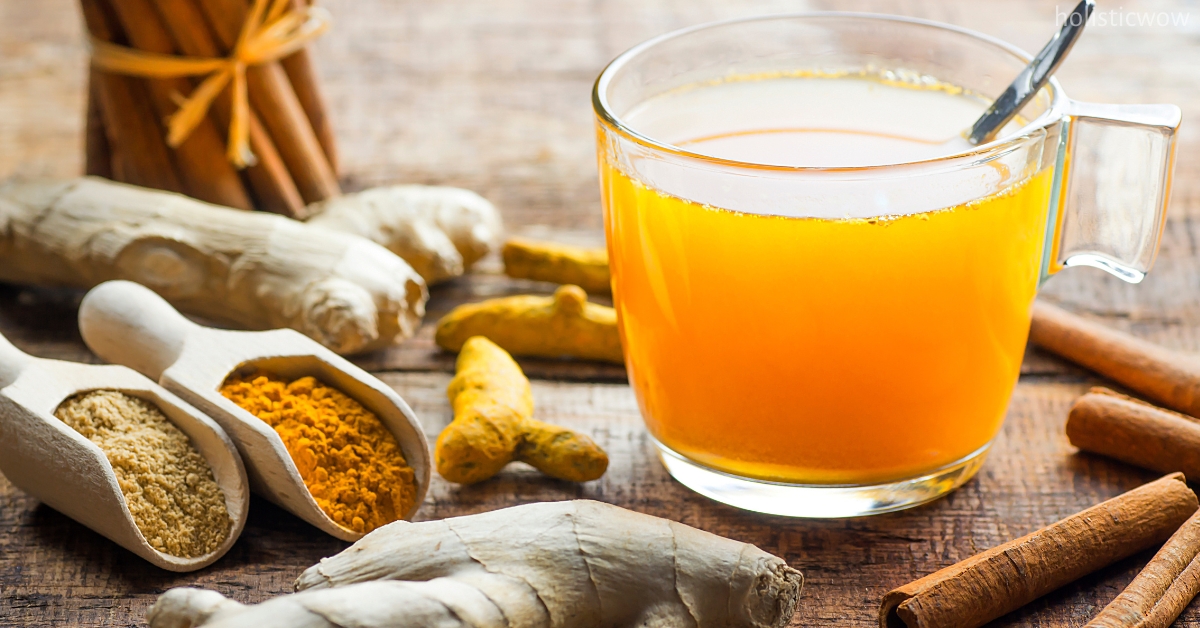What Are the Benefits of Using Turmeric for a Cold?
Turmeric may offer several benefits for those experiencing a cold.
Its active compound, curcumin, has scientifically recognized anti-inflammatory properties that may help reduce inflammation in the respiratory system. This could contribute to easing symptoms such as a sore throat and congestion.
Additionally, turmeric may help regulate immune function, potentially supporting the body’s ability to respond more effectively to infections.
Turmeric also has strong antioxidant properties , which contribute to overall health and may aid in reducing oxidative stress during a cold.
While more research is needed, incorporating turmeric into your diet as a complementary approach to cold management may help alleviate symptoms and support the body’s healing process.
Key Takeaways
- 🌿 Natural Inflammation Fighter: Turmeric’s active compound, curcumin, possesses anti-inflammatory properties that can help reduce inflammation in the respiratory system, potentially easing cold symptoms like sore throat and nasal congestion.
- 🛡️ Immune Support Booster: Regular intake of turmeric may enhance immune function, supporting your body’s natural defenses against infections and helping manage cold symptoms more effectively.
- 🧪 Antioxidant Protection: The antioxidant properties of turmeric can help reduce oxidative stress, promoting overall health and potentially aiding in faster recovery from colds.
- 🍵 Enhanced Absorption Tips: For better absorption and effectiveness of curcumin, consider combining turmeric with black pepper or fat sources, and enjoy it in warm drinks like turmeric tea or golden milk.
How Does Curcumin in Turmeric Help with Cold Symptoms?
Curcumin, the active compound in turmeric, is known for its anti-inflammatory and antioxidant properties, which may contribute to symptom relief during a cold.
It may help reduce inflammation in the respiratory tract, which could help alleviate symptoms like sore throat and nasal congestion.
Additionally, curcumin has been shown to modulate immune responses , potentially supporting the body’s ability to combat the cold virus more effectively.
However, curcumin’s bioavailability is limited, so consuming it with black pepper or in a formulated supplement designed for better absorption may improve its effectiveness.

Can Turmeric Help Reduce Inflammation During a Cold?
Turmeric has potential benefits for reducing inflammation during a cold due to its clinically studied anti-inflammatory properties .
Curcumin has been found to lower certain markers of inflammation in the body, which may h elp alleviate symptoms like sore throat and nasal congestion associated with respiratory infections.
While more research is needed, some studies suggest that turmeric may support respiratory health and provide relief during a cold by helping regulate the body’s inflammatory response.
How Do Antioxidants in Turmeric Support Respiratory Health?
Turmeric’s antioxidants, particularly curcumin, may help support respiratory health by reducing oxidative stress and inflammation.
Oxidative stress can damage respiratory tissues, potentially worsening cold symptoms. Turmeric’s antioxidants could help maintain healthy respiratory function by neutralizing free radicals and helping regulate inflammation.
Some research suggests that curcumin might help alleviate symptoms associated with colds and respiratory infections, but further clinical studies are needed to confirm its effectiveness.
What Is the Role of Turmeric Tea in Boosting Immune Function?
Turmeric tea may help support immune function due to curcumin, which has demonstrated anti-inflammatory and antioxidant properties.
Research suggests curcumin can influence immune responses by modulating various immune cells and cytokines.
Drinking turmeric tea may provide additional immune support and could potentially help lessen the severity of cold symptoms.
The warm liquid soothes sore throats and provides hydration, which is essential for cold recovery.
While turmeric tea is a beneficial and comforting drink, curcumin’s effectiveness depends on its bioavailability. Consuming it with black pepper or a fat source may enhance absorption.
Is Turmeric Milk Effective as a Healing Drink for Colds?
Turmeric milk, also known as “golden milk,” may be a supportive healing drink for colds .
Combining turmeric and warm milk provides anti-inflammatory and antioxidant benefits, which could help soothe cold symptoms such as sore throat and congestion.
These properties may also aid in immune function, potentially supporting the body’s ability to fight off infections.
Additionally, the warmth of the milk offers a soothing effect and contributes to hydration, making it a helpful addition to other cold remedies.

Should You Combine Turmeric with Ginger for Cold Relief?
Combining turmeric with ginger may help support cold relief by enhancing their complementary anti-inflammatory and immune-modulating benefits.
Both ingredients contain bioactive compounds that may help reduce inflammation and support the body’s natural defenses.
Ginger is known for alleviating nausea and supporting digestion, while turmeric contains curcumin, which has been studied for its potential role in managing inflammation and respiratory health.
Together, these ingredients may provide enhanced symptom relief compared to using either alone.
Adding them to teas or warm drinks like golden milk can nourish and soothingly incorporate their potential benefits when experiencing a cold.

How Can Piperine Enhance the Benefits of Turmeric for a Cold?
Piperine, a compound found in black pepper, enhances the absorption of curcumin, the active component in turmeric.
Piperine may help amplify turmeric’s potential anti-inflammatory and antioxidant effects by increasing curcumin’s bioavailability by up to 2,000%.
These effects could support immune function and potentially help alleviate cold symptoms such as sore throat and congestion.
To maximize potential benefits, combine turmeric with piperine in warm beverages like teas or soups. This combination may provide additional immune support and aid respiratory health during a cold.
What Other Ingredients Can Be Combined with Turmeric for Cold Relief?
Combining turmeric with other natural ingredients may enhance its potential benefits for cold symptom relief.
Consider pairing turmeric with:
- Honey which has natural soothing properties and may help ease a sore throat.
- Lemon which provides vitamin C, a key nutrient that supports immune function.
- Ginger, which has anti-inflammatory and digestive-supporting properties.
Together, these ingredients create a comforting and supportive remedy that may help promote respiratory health and overall well-being during a cold.
While research suggests that turmeric has anti-inflammatory and immune-modulating properties, its effects on cold symptoms may be more pronounced when combined with other supportive ingredients.
What Are Some Natural Remedies Using Turmeric for Cold and Flu?
Natural remedies using turmeric for cold and flu include sever al supportive options:
- Turmeric tea, which contains anti-inflammatory properties that may help soothe sore throats and congestion.
- Golden milk, a comforting blend of turmeric and warm milk, which may provide immune-supporting and anti-inflammatory benefits.
- Turmeric-infused soups, which offer warmth, nourishment, and additional symptom relief.
Combining turmeric with other beneficial ingredients like ginger, honey, and lemon may enhance the effects of these remedies:
- Ginger provides additional anti-inflammatory benefits and supports digestion.
- Honey has soothing properties that may help relieve throat irritation.
- Lemon supplies vitamin C, which is essential for a healthy immune response.
These combinations create gentle, natural approaches to supporting immune function and alleviating cold symptoms , while also promoting overall well-being.
Herbal Preparations and Recipes for Cold Relief
Herbal remedies may help alleviate cold symptoms by utilizing the potential anti-inflammatory and immune-supporting properties of certain herbs. The following recipes focus on turmeric, which has been studied for its role in modulating inflammation and supporting immune function.
Always consult a healthcare provider before starting any new herbal regimen, especially if you have existing health conditions or are taking medications.
Turmeric Soothing Tea
Ingredients:
- 1 teaspoon turmeric powder
- 1 cup of hot water
- Honey (to taste, optional)
- Lemon juice (to taste, optional)
Preparation:
- Place turmeric powder in a cup.
- Pour hot water over the turmeric.
- Stir well and let it steep for at least 10 minutes.
- Strain if desired, then add honey and lemon juice to taste.
Drink up to 1-2 cups daily to help provide soothing relief for cold symptoms and support hydration.
Warnings: Turmeric may interact with certain medications, including blood thinners and diabetes medications. Individuals with gallbladder issues or those prone to kidney stones should consult a healthcare provider before using it. Pregnant individuals should also consult a healthcare provider before consuming it medicinally.
Turmeric Immune-Supporting Herbal Blend
Ingredients:
- ½ teaspoon turmeric powder
- ½ teaspoon dried ginger root
- ½ teaspoon dried thyme
- ½ teaspoon dried chamomile
- 1 cup of boiling water
Preparation:
- Combine all herbs in a teapot.
- Add boiling water and steep for 10-15 minutes.
- Strain and serve.
- Drink up to 1 cup 2 times daily or as needed for comfort.
This combination of herbs may provide complementary support for inflammation, immune function, and temporary relief from cold symptoms.
Warnings: Ginger may cause mild digestive discomfort in some individuals and can interact with blood thinners. Chamomile may trigger allergic reactions in individuals with sensitivities to plants in the Asteraceae family. Pregnant individuals should consult a healthcare provider before use .
These herbal blends support comfort during a cold through their potential anti-inflammatory and immune-modulating properties. However, they are not a cure and should be used as part of a balanced approach to wellness. Always consult a healthcare provider before starting any new herbal regimen, particularly if you have existing health conditions or are taking medications.

